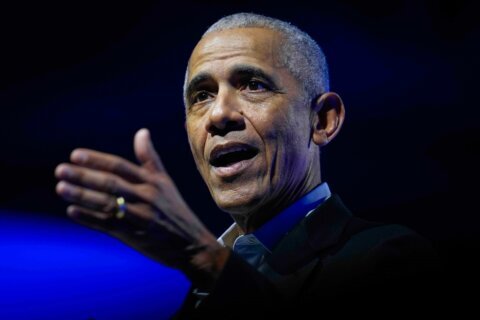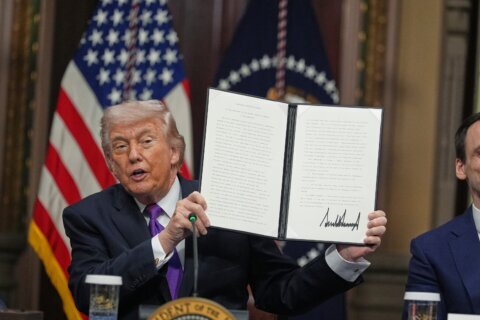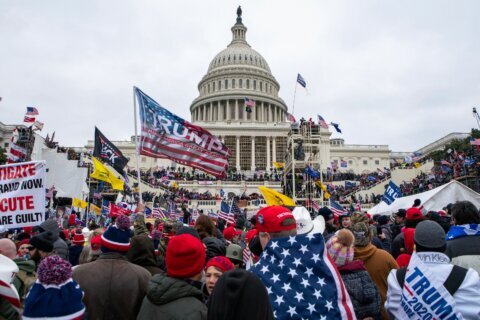This article was republished with permission from WTOP’s news partner InsideNoVa.com. Sign up for InsideNoVa.com’s free email subscription today.
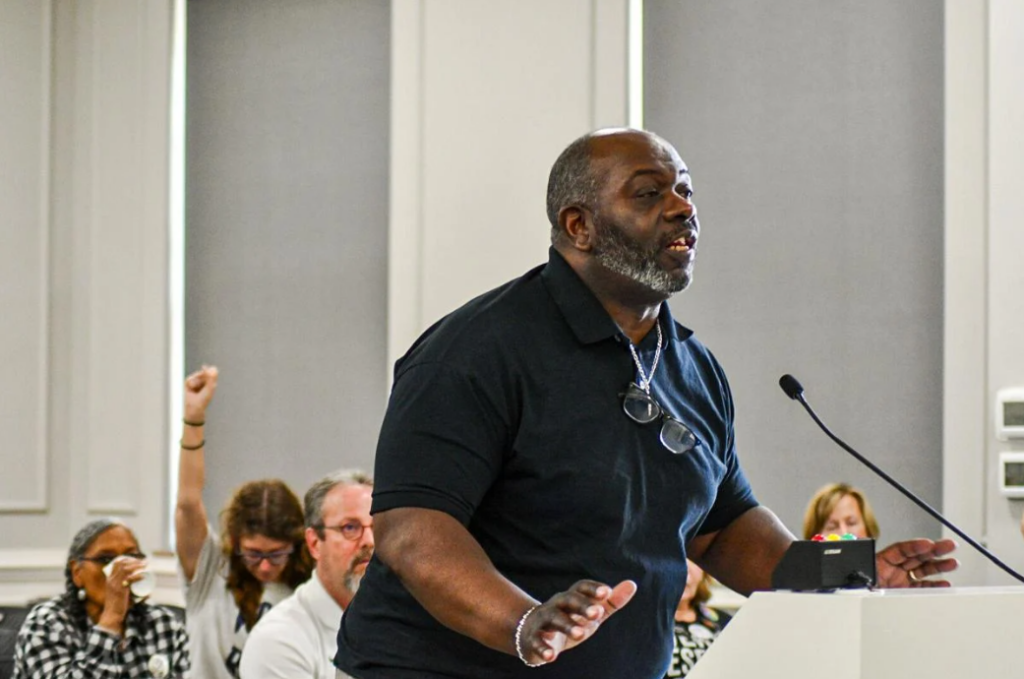
This article was written by WTOP’s news partner InsideNoVa.com and republished with permission. Sign up for InsideNoVa.com’s free email subscription today.
For 151 consecutive weeks, every Saturday from 10 to 10:45 a.m., demonstrators with the Black Lives Matter Vigil for Action had faithfully gathered at the Court House Square Plaza in Old Town Warrenton to promote racial equality and justice.
The location of the vigil was not random. It held a profound historical significance as a place where enslaved people once were bought and sold.
But last month, town staff notified vigil participants and “All Lives Matter” counter-protestors they would need to relocate both demonstrations a quarter mile down the road at Eva Walker Park. The sudden shift confused vigil protestors, including Joe Washington, a Fauquier NAACP representative who found himself asking, “What changed?”
Washington and other vigil participants claim it was not until a month later when Black Lives Matter demonstrators appealed to the Town Council – which denied their petition to remain at the plaza in a 4-3 vote during its June 13 work session—that they got an answer: public safety.
A problematic intersection
During the work session, Warrenton Police Chief Timothy Carter recounted to councilmembers several instances of “near misses of vehicles” and “potential pedestrian incidents,” which he and his command staff had witnessed over the last three years standing watch over the vigil. Carter argued that having both groups in the square could distract drivers, risking the safety of everyone involved—demonstrators, drivers and pedestrians alike.
“And so, based on this information, I made the decision that this was not a safe intersection for both groups to be up there,” Carter told council members. “Not only for them, because this is not just about them. This is about the safety of all the citizens of the town of Warrenton.”
While vigil participants sympathize with the traffic safety issue, a few contend the decision violates their free speech.
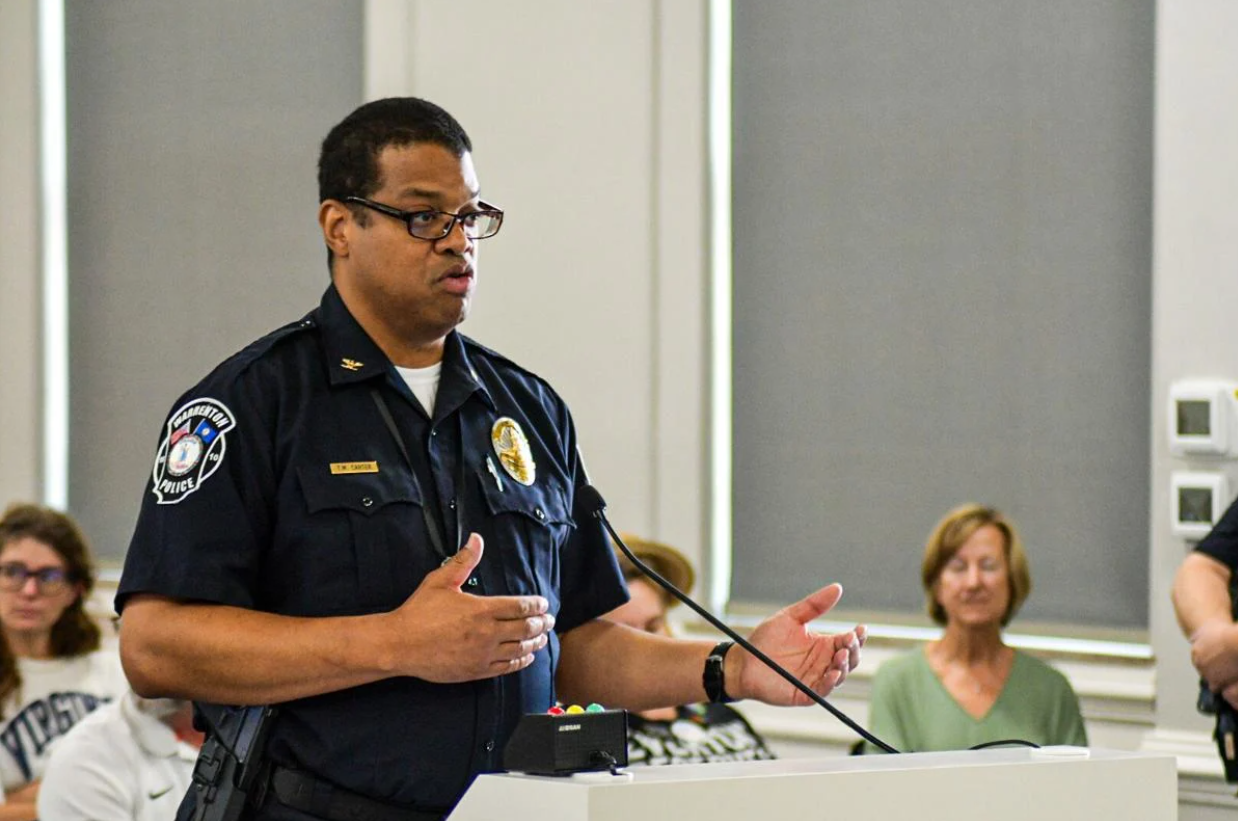
“I think is a civil rights issue,” Washington told FauquierNow. “I think it’s a humanitarian issue. I think it’s a First Amendment issue. It’s all those three things rolled into one.”
In a separate interview, Carter said no specific incident triggered the decision to relocate both groups. Rather, it was a conclusion he and his colleagues arrived at following several discussions, intending to execute the plan eventually.
It was a coincidence, Carter said, that Ike Miller, the owner of Miller Carpets, applied on April 28 to occupy the Courthouse Square three calendar days before representatives of Black Lives Matter submitted theirs.
“And so, per our ordinance, that space belongs to Miller Carpets, as long as there’s nothing wrong with their request,” Carter told FauquierNow.
When asked why he chose to apply for the permit, Miller said that after three years of having to watch both groups demonstrate directly across the street from his business, he felt compelled to send out a positive message about the town.
“My thought was every week we’ll do ‘thank you’ to the town of Warrenton and to the county,” Miller told FauquierNow. “Thank you to the teachers. Thank you to the town police. Thank you to the [Fauquier County Sheriff’s Office]. Thank you to the first responders … the members of our staff would put out banners so there’s something positive and very noncontroversial going on at the entrance to Warrenton.”
Miller emphasized he has no opinion regarding “Black Lives Matter” (not affiliated with the Black Lives Matter Global Network Foundation) or “All Lives Matter” demonstrations. Moreover, the second-generation business owner said he thinks both groups exercising their First Amendment rights is a “phenomenal thing.”
But for the last few years, Miller said that each time someone from out of town has come into his store, they have expressed concern about the police presence outside.
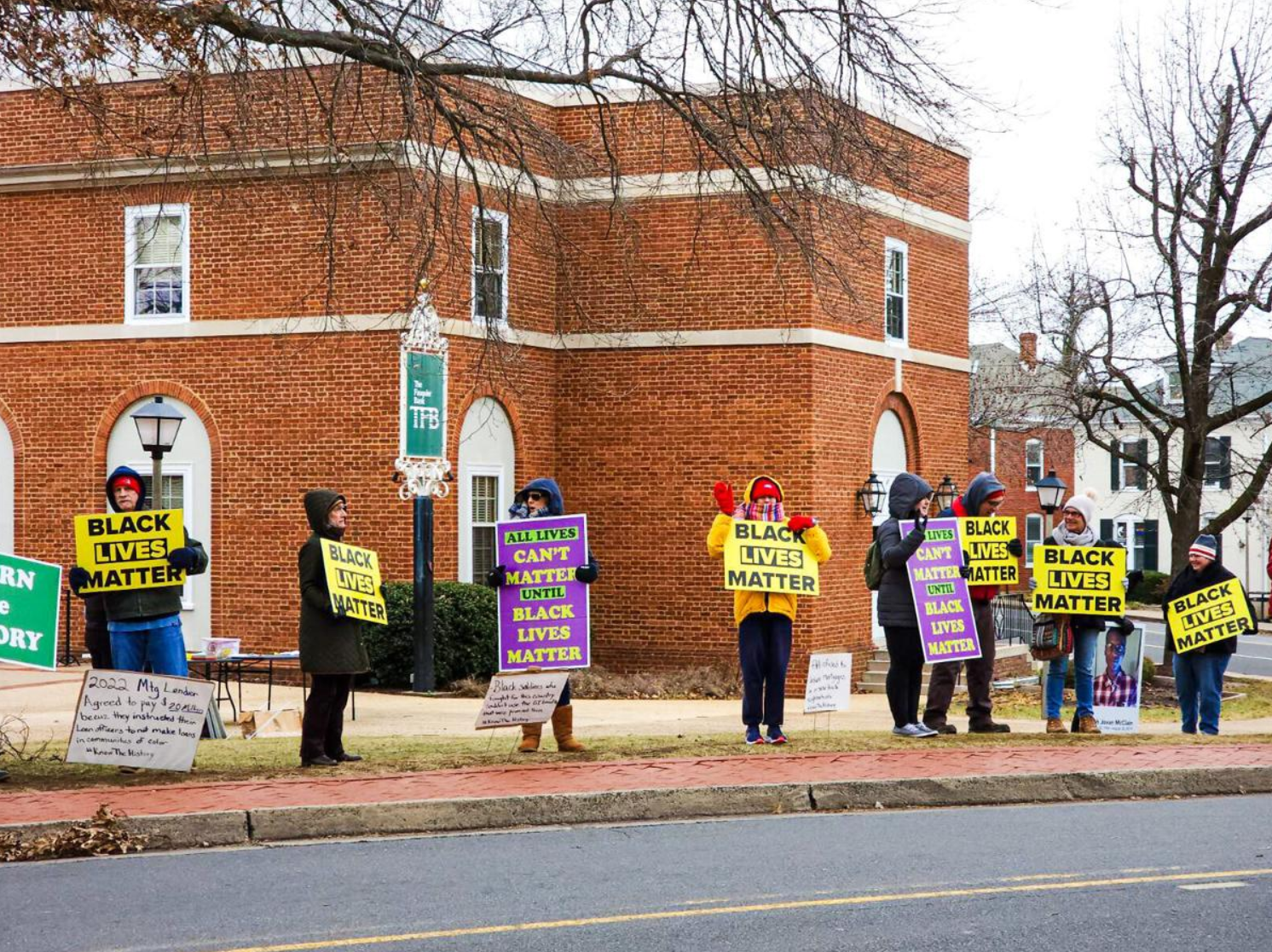
“I literally had someone come in, a middle-aged lady, who said, ‘I don’t feel comfortable shopping here,’ and they left,” Miller said. “I’ve had other people come in and ask, ‘Is something going to happen out here?’… And it got to the point where I was just kind of fed up.”
Since his permit was approved, Miller said he has chosen not to occupy the square because he agrees it’s unsafe for anyone to demonstrate — “period” — in that space.
“This is a very dangerous, confusing intersection. From our vantage point, we see the confusion every single day. I agree with Chief Carter 100% that it’s many accidents waiting to happen, and other accidents have happened here,” Miller said.
Case-by-case basis
Washington said he understands people’s concerns about drivers getting distracted, and he sympathizes with the need to address public safety concerns. Nevertheless, he argued that “it’s incumbent upon the driver of the vehicle” to be safe.
“They are responsible for themselves,” Washington said.
Washington added he felt the town had not “exhausted” all other options before deciding to move demonstrators, such as installing additional stop signs as it did recently at the intersections of Ashby Street and West Lee Street or Waterloo Street and Chestnut Street.
“There are ways that will work that will accommodate everyone and will be cost-effective to,” he said.
But Carter, who is also the chair of a local traffic safety work group made up of various town officials, claims it’s become his priority to try to remediate the intersection so that it’s safer.
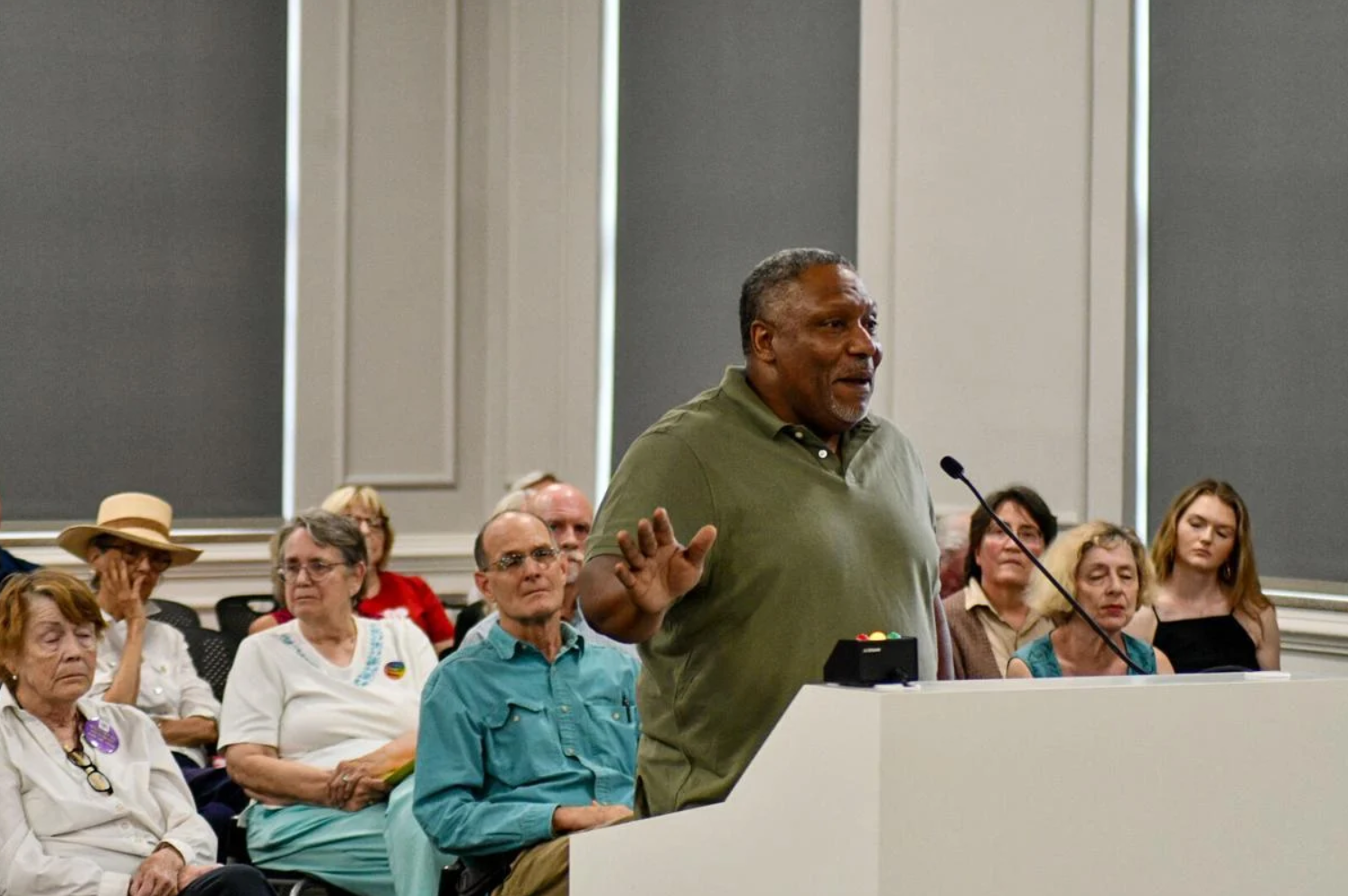
“There’s an assumption that the only thing that was done was we moved the two groups to the park, and that was the end of it. That’s not true,” Carter said.
The workgroup has not discussed the remediation issue but Carter noted they plan to do so in the coming weeks.
In the meantime, Carter emphasized groups of more than 15 but fewer than 200 people (the required threshold for a public gathering permit) may still apply for a permit to gather in the square. However, the police chief said applications would be evaluated on a “case-by-case basis.”
“As the Chair [of the Special Events Task Force group] … given those same parameters … I don’t plan on approving any events in that area, regardless of who it is, regardless of what they want to do,” Carter said.
Holding out hope
Addressing councilmembers during their June 13 work session, Rev. Vinicent Holland, pastor of the Shiloh Baptist Church in Woodville and associate pastor at First Baptist Church in Warrenton, claimed there have been “no accidents” while the vigil has occupied the Court House Square Plaza. He also argued that if “visual distractions” were a concern, the council should apply the same logic to parklets and other activities on Main Street.
“I don’t think we’d want to eliminate those simply because it’s a distraction,” Holland said during the work session. “There is no monetary gain from the vigil. We understand that. But there is social gain from the vigil.”
Unlike Miller, Holland emphasized he knows many people who feel more “comfortable coming to Warrenton to shop and spend money” because the presence of the vigil represents tolerance and support for racial justice.
Aside from the fact that the vigil will be less visible to the public, Holland argued the Town Council’s decision to deny Black Lives Matter Vigil for Action’s appeal to stay in the square indirectly handed the “All Lives Matter” demonstrators – who have protested the vigil occupying the square the last few years – a “victory.”
“This is what they wanted all along—to get the vigil out of high visibility and have it set to a remote area, and they’ve accomplished that,” Holland said.
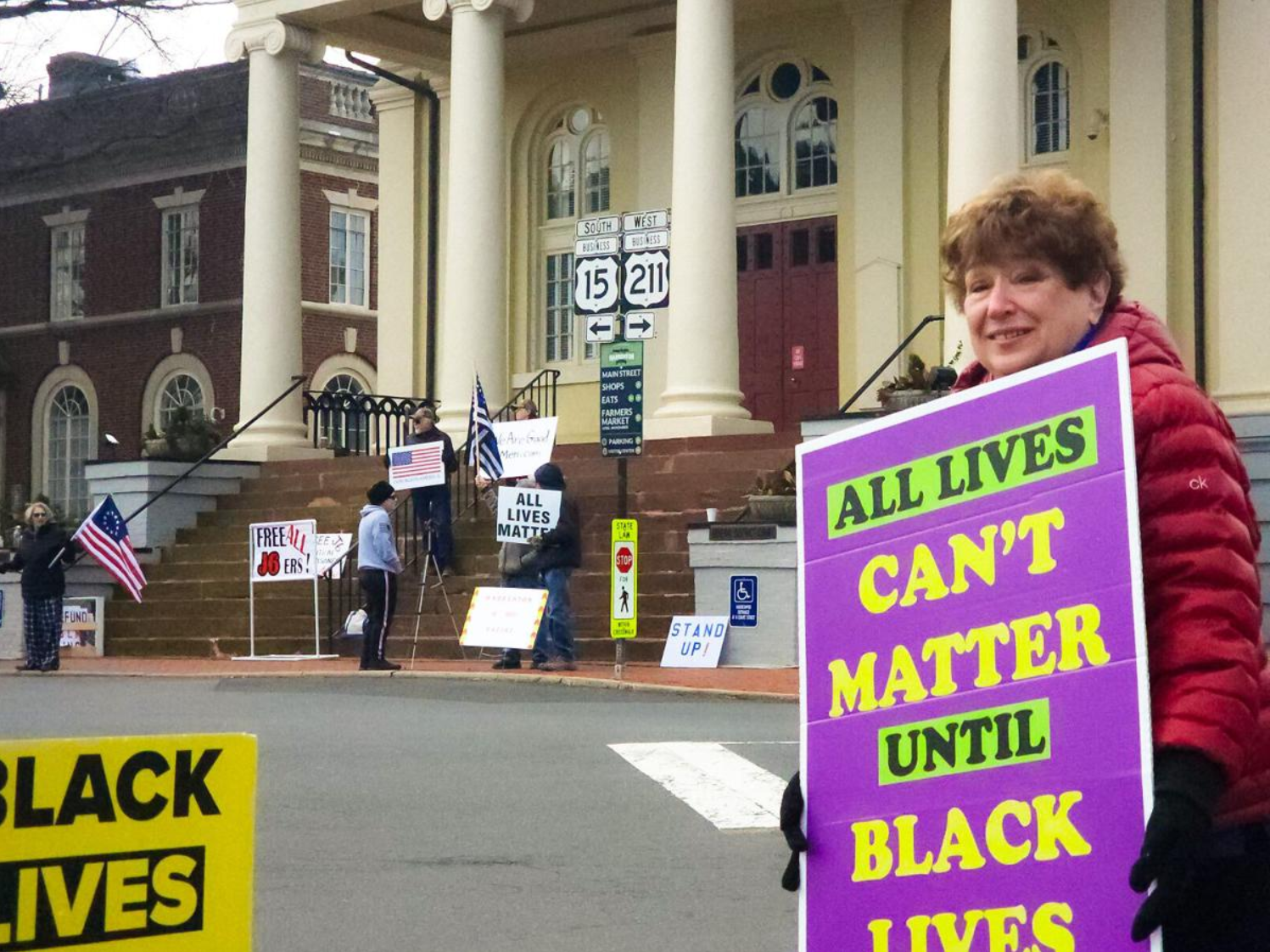
During the council’s June 13 evening meeting, Warrenton resident Bill Doerler, who often participates in “All Lives Matter” counter-protests, confirmed their group stopped protesting because they achieved their goal: to move the vigil off Main Street.
“[The vigil] is not being told that they have to stop. They’re just being asked to move elsewhere. And I believe that’s a reasonable accommodation,” Doerler said.
Responding to Holland’s concerns, At-Large Councilmember David McGuire, who voted with the majority to deny the vigil’s appeal, said neither group should attach “meaning” to the police chief’s decision to move both groups to the park because it’s an act of public safety, not bias.
“I was always taught an officer on duty knows no one. He cannot be biased, or she cannot be biased, toward one group or another. It’s all about upholding the law. And the law cannot be personal,” McGuire said during the June 13 meeting. “I commend the chief for coming up here and saying what he had to say because it’s difficult.”
Councilmembers Mooney, At-Large, Brett Hamby, Ward 3, and Vice Mayor James Hartman, Ward 4, also voted to deny the appeal. Councilmembers Heather Sutphin, Ward 1, William Semple, Ward 2, and Jay Heroux, Ward 5, voted to approve the appeal. The mayor does not have a vote, per the town charter.
When asked if the vigil participants plan to stay in Eva Walker Park, Holland affirmed the group would continue to hold the event “wherever we’re allowed to have it.”
But he added Black Lives Matter Vigil for Action would continue to lobby the town to “make sure that square is safe so we can return.”
“The vigil is probably doing more good in the long run because it is making us reflect and take a look at ourselves … and it’s been very peaceful,” Holland told FauquierNow. “I think that it shows that we can do things without having to fight.”

